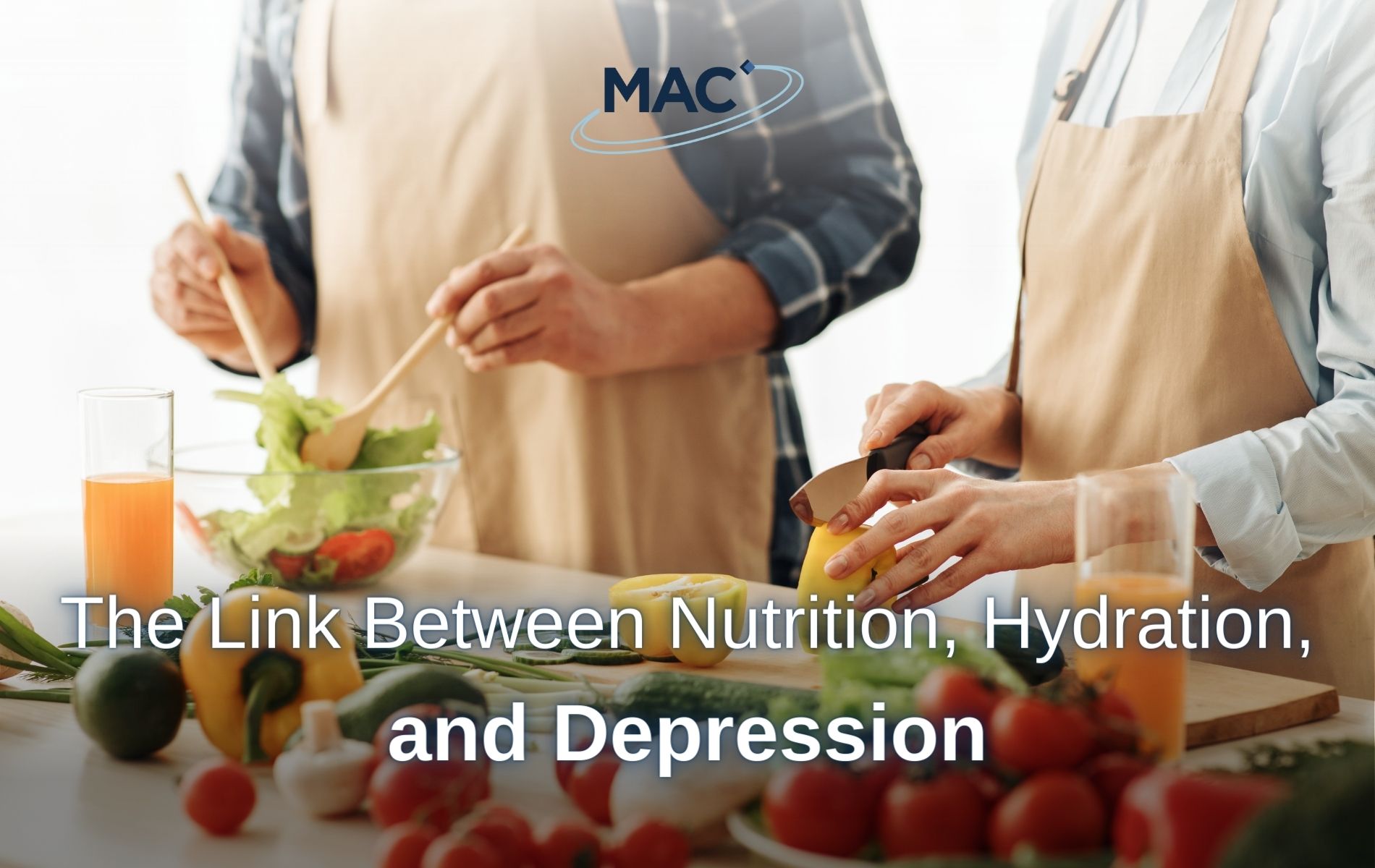In our fast-paced lives, amidst daily tasks and responsibilities, it’s all too easy to overlook the surprising connection between what we consume and our mental wellbeing. As we celebrate Nutrition and Hydration Week, we’re raising awareness of the link between nutrition, hydration, and depression.
What is Depression?
Depression, sometimes referred to as Major Depressive Disorder (MDD), is when a person experiences intense and overwhelming feelings of sadness and hopelessness. Around 1 in 6 adults in the UK stated they have experienced moderate to severe depressive symptoms1.
How does nutrition affect mental wellbeing?
We often associate nutrition with physical health; the fuel for our bodies to function optimally, however, our dietary choices can also impact our brain function and mood regulation.
For instance, omega-3 fatty acids found in fatty fish like salmon and flaxseeds have been linked to reduced rates of depression and improved cognitive function. In a 12-week study conducted with patients living with major depression who did not receive benefit from antidepressants, results showed improvement in symptoms when treated with omega-3 supplements2.
Likewise, the gut microbiome influences neurotransmitter production and immune function. A diet rich in fibre, fruits, and vegetables fosters a diverse microbial ecosystem, promoting mental resilience and emotional wellbeing. In research conducted with those living with depression, a 5-gram increase in total dietary fibre intake resulted in a 5% reduction in the risk of depression3.
Conversely, a diet high in processed foods, sugar, and unhealthy fats can fuel inflammation and oxidative stress, exacerbating depressive symptoms. In a study amongst the top fifth consumers of ultra-processed foods, it was found that they had a 50% higher risk of developing depression4 compared to those who consumed the least amount of ultra-processed foods. This emphasises the importance of whole, nutrient-dense foods in mental health maintenance.
How does hydration affect mental wellbeing?
Nutrition is only one piece of the puzzle. Hydration, often overlooked in discussions of mental health, plays an equally crucial role. Being dehydrated by only 2% can impair cognitive function, exacerbate fatigue, and dampen mood5.
Emerging research suggests a bidirectional relationship between hydration status and mood regulation. Dehydration may increase cortisol levels, the body’s primary stress hormone, while adequate hydration supports proper neurotransmitter function, promoting emotional stability and resilience.
In an analysis of those who drank less than two glasses of water a day, it was found that they had double the risk of depression compared to those who drank more than five glasses6.
How to prioritise nutrition and hydration for mental wellness
First and foremost, ensure you are consuming a balanced diet rich in whole foods, including fruits, vegetables, lean proteins, and healthy fats. Incorporate omega-3 sources like fish, flaxseeds, and walnuts into your meals, and limit processed foods and added sugars.
Additionally, stay hydrated by drinking plenty of clean water throughout the day. Aim for at least eight glasses daily7, adjusting for factors like activity level and climate.
Living with Depression?
If you or a loved one is living with depression, you could help researchers investigate potential new treatments. Register your details to join our clinical trial database and we will contact you when a suitable trial becomes available.
If eligible, you may receive financial reimbursement for your time and commitment to a study, as well as reasonable travel expenses and a full health check-up!
To register your interest, visit our current trials webpage.
1 Office for National Statistics – Cost of living and depression in adults, Great Britain: 29 September to 23 October 2022
2 Journal of Clinical Medicine – Supplementation with Omega-3 Fatty Acids in Psychiatric Disorders: A Review of Literature Data
3 Nutritional Neuroscience – Dietary fiber intake, depression, and anxiety: a systematic review and meta-analysis of epidemiologic studies
4 Harvard TH Chan – Ultra-processed foods may increase risk of depression
5 Journal of the American College of Nutrition – Cognitive performance and dehydration
6 World Journal of Psychiatry – Drinking plain water is associated with decreased risk of depression and anxiety in adults: Results from a large cross-sectional study
7 NHS – Water, drinks and hydration




